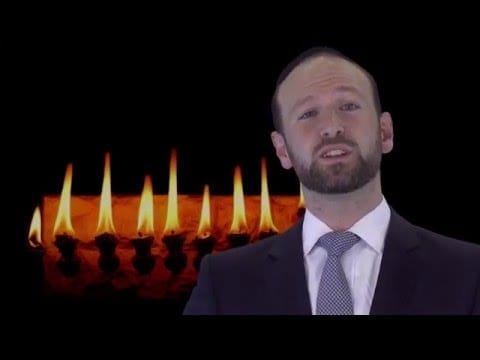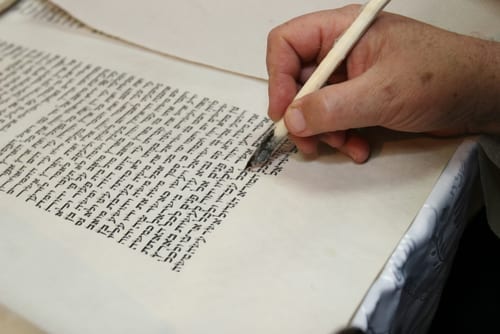Read Hanukkah: The Full Story (part 5) – Antiochus Rises to Power, now!
Shabbat
“The children of Israel shall observe the Shabbat, to keep the Shabbat throughout their generations as an everlasting covenant. Between Me and the children of Israel, it is forever a sign that [in] six days the Lord created the heaven and the earth, and on the seventh day He ceased and rested.”
(Ex. 31:16-17)
Keeping Shabbat is a declaration that there is a Creator who created the world in six days and rested on the seventh day, and we are His subjects and prostrate ourselves before Him! The Greeks wanted to uproot this belief from the heart of every Jew, and tell them instead: We are the lords of the land! You are subjugated to us!
Circumcision
Circumcision is also a special sign between us and G-d, showing that we can solely use our body in accordance with G-d’s Will. G-d guides us to restrain our inner passions, and use them properly. In contrast, the Greeks believed in removing all restraints and suppressing all inhibitions, and living a hedonistic life. Everything is permitted and no one has any right to tell you what to do.
Sanctification of the Month
Determining the new month reminds us that G-d has power over time and controls it. On the day that the court sanctified the month, it became sanctified, and the holidays that were calculated by the beginning of the month, were also sanctified. This was a stunning declaration that nobody in the world could change the nature of time besides the Jewish sages. The Greeks could not agree to that. They said, “We will determine the calendar, and the Jews will not determine for themselves when their various holidays will fall. We will make all the decisions.”
Beauty Becomes Ugliness
The beauty of Yapheth when it serves a person in his divine worship, is indeed beautiful. But when it is used to torment the Jewish people, there was nothing uglier. Strength becomes tyranny and cruelty, wisdom is utilized for evil schemes, and truth is distorted.
A world without a creator, a body without restraint, time without sanctification — makes for a miserable world.
War of Extermination
Before Antiochus left the land of Judah, he entrusted it to Phillipus, his army minister, and ordered him: “Whoever listens to my commands, bows down to my statue, eats pork, and leaves the Mosaic religion — you should allow to live. But all those who refuse — shall be killed without mercy.”
Those were bitter and dreadful days for the Jewish people, and especially for the Jews of Jerusalem. The Greeks made thirteen breaches in the Temple’s inner courtyard (the Azara), they cancelled the two daily sacrificial offerings (korban tamid) that the Creator of the universe had commanded to be sacrificed every day. They defiled the oils for lighting the candelabrum, and desecrated the Temple with their idol worship and acts of abomination. Jewish daughters were abused by the enemy tyrant, and Shabbat and holidays were completely forgotten.
On 15 Kislev of 3593 (167 C.E.), the Greeks erected a statue in the Temple and desecrated G-d’s altar! They also built altars for idols in all the cities of Judah, and tore Torah scrolls apart and burned them in fire. Anyone who feared the word of G-d escaped from the city and sought refuge in one of the villages in the Judean hills. At first, they were able to hide there from the eyes of wicked Antiochus’s officers, and observe the Torah’s commandments.
This solution, however, was only temporary, and after the Greeks based their depraved reign in Jerusalem, they began searching the villages and mountains to find Jews who were still observant. It was a bitter and frightful ordeal for faithful Jews. They hid in forests and caves, and were willing to give up their lives to sanctify G-d when the enemies found them there. Thousands of men, women and infants, gave up their lives for the sanctification of G-d’s Name and were slaughtered and killed for observing the Torah, may G-d avenge their blood.
The Death of Eleazar, the Officer in Charge of the Priests
The Greeks caught Eleazar, the officer in charge of the priests, who was already very old (he was the Eleazar who had led the entourage to Ptolemy II to translate the Torah into Greek), and brought him before Phillipus. Phillipus told him, “Eleazar the priest, you are a wise and prudent man! Do not transgress the order of our lord the king. Worship his statue, and eat meat from its sacrifice, and then you will live and not die.”
Eleazar the priest replied: “G-d forbid that I should break the commandment of my G-d, the Al-living G-d and King of the universe, and instead to carry out the commandment of Antiochus whose life is like a passing shadow.”
When Phillipus saw that he could not convince Eleazar to obey him, he decided on another tactic. He told him secretly, “You know that for many years now, I liked you and respected you. I know you since the time I was a servant of King Ptolemy. When you came with your friends to translate the Torah for him, I got to know your greatness and esteemed status. Now I feel sorry for you in your old age, and I do not want to harm you. So I would like to make you another suggestion: Take a piece of your own kosher meat, and eat it in front of your people so they think you're eating meat from a sacrifice to Antiochus’s statue. If you do this. I will have mercy on you, and will not kill you.”
But Eleazar the priest would not agree to that. He turned to Phillipus and said: “Listen to me, Phillipus, official of Antiochus! I am today ninety years old, and all my life I was devoted to and lived in awe of the G-d of Israel. So how can I come today to carry out such a deception and violate His covenant?! If I will do as you say, I will cause Israel to sin, because the Jews will say, ‘Here is Eleazar the priest, who at ninety years of age left the teachings of his G-d and broke His covenant. So why should we maintain our portion in G-d's Torah?’ They will also break G-d's covenant and leave his Torah and their souls will end in destruction. G-d forbid that I should taint the purity of my old age to cause the Jews to weaken in their belief in G-d. It is better that I die and leave behind a record of bravery and valor for my people and my young men. Kill me here, and I will live with the G-d of Israel in the Next World. When the Jews see how I was killed by you — they will also give up their lives for the precious Torah of our G-d, and then I and they will all live!”
When Phillipus heard Eleazar’s words, he hardened his heart, and decided to continue his persecutions of the Jews with all his might. He ordered that every Jew who clings to G-d’s Torah be tortured, and commanded that Eleazar the priest be subjected to excruciatingly painful tortures.
As they brutally tortured him, Eleazar the priest prayed: “My G-d! You knew that I could save myself from this death. But I didn’t want to because I love You. I do not have the strength to bear their brutal tortures, but because of the great love that burns in my heart for You — these blows are beloved to me, and I will bear them with resilience and courage. And You, in Your great mercy, have mercy on Your people Israel, and saved them from the enemy and oppressor.” And after he finished praying to G-d, his pure soul rose to heaven. He became an example of courage and valor to his people. (Josephus Chapter 18, Hasmoneans 2:6)





